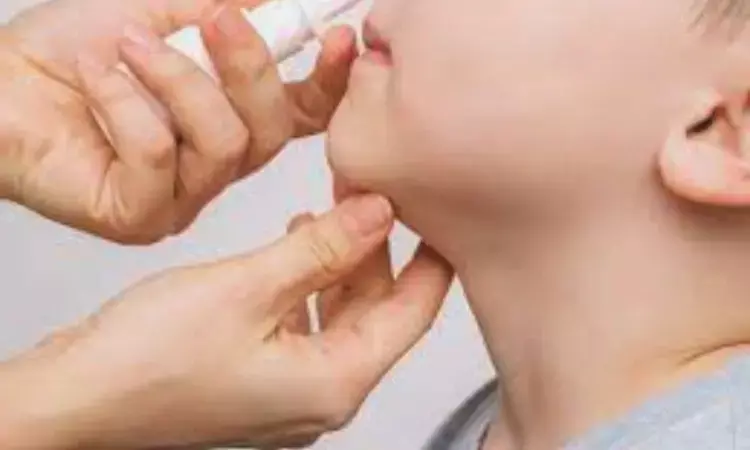- Home
- Medical news & Guidelines
- Anesthesiology
- Cardiology and CTVS
- Critical Care
- Dentistry
- Dermatology
- Diabetes and Endocrinology
- ENT
- Gastroenterology
- Medicine
- Nephrology
- Neurology
- Obstretics-Gynaecology
- Oncology
- Ophthalmology
- Orthopaedics
- Pediatrics-Neonatology
- Psychiatry
- Pulmonology
- Radiology
- Surgery
- Urology
- Laboratory Medicine
- Diet
- Nursing
- Paramedical
- Physiotherapy
- Health news
- Fact Check
- Bone Health Fact Check
- Brain Health Fact Check
- Cancer Related Fact Check
- Child Care Fact Check
- Dental and oral health fact check
- Diabetes and metabolic health fact check
- Diet and Nutrition Fact Check
- Eye and ENT Care Fact Check
- Fitness fact check
- Gut health fact check
- Heart health fact check
- Kidney health fact check
- Medical education fact check
- Men's health fact check
- Respiratory fact check
- Skin and hair care fact check
- Vaccine and Immunization fact check
- Women's health fact check
- AYUSH
- State News
- Andaman and Nicobar Islands
- Andhra Pradesh
- Arunachal Pradesh
- Assam
- Bihar
- Chandigarh
- Chattisgarh
- Dadra and Nagar Haveli
- Daman and Diu
- Delhi
- Goa
- Gujarat
- Haryana
- Himachal Pradesh
- Jammu & Kashmir
- Jharkhand
- Karnataka
- Kerala
- Ladakh
- Lakshadweep
- Madhya Pradesh
- Maharashtra
- Manipur
- Meghalaya
- Mizoram
- Nagaland
- Odisha
- Puducherry
- Punjab
- Rajasthan
- Sikkim
- Tamil Nadu
- Telangana
- Tripura
- Uttar Pradesh
- Uttrakhand
- West Bengal
- Medical Education
- Industry
Daily Incense Exposure and Recent Antibiotic Use Increase Risk of Sinus Infection in Children, Study Finds

Taiwan: Children exposed to daily incense burning or those who had recently taken antibiotics face a significantly higher risk of developing acute bacterial paranasal sinusitis (ABPS), according to a recent study published in BMC Infectious Diseases. The research, led by Ting-Fang Chiu and colleagues from the Department of Pediatrics at Taipei City Hospital, highlights key environmental and medical factors contributing to this common pediatric infection.
- Children diagnosed with acute bacterial paranasal sinusitis (ABPS) were generally younger compared to those who did not have the infection.
- Two major risk factors stood out in the study: daily exposure to residential incense and recent antibiotic use.
- Incense exposure was linked to more than double the risk of developing ABPS, with an adjusted odds ratio (aOR) of 2.45.
- Antibiotic use within the previous three months was associated with an even higher risk, showing an eight-fold increase in the likelihood of ABPS, with an adjusted odds ratio (aOR) of 8.04.
- Interestingly, some commonly assumed factors did not show adverse effects in this analysis.
- Nose blowing, which is often considered risky during sinus infections, was actually found to be harmless and even correlated with a better treatment response.
- On the other hand, nasal irrigation offered no significant advantage in treatment outcomes and did not reduce the likelihood of developing ABPS.
- The authors acknowledged certain limitations. The reliance on self-reported data through questionnaires may introduce recall bias, as participants might not accurately remember past exposures or antibiotic usage. Additionally, the study did not measure the exact duration or concentration of incense exposure, which could influence the strength of the association. Moreover, detailed medical records regarding previous antibiotic prescriptions, including reasons for use, were lacking, which might affect the interpretation of findings.
Dr Kamal Kant Kohli-MBBS, DTCD- a chest specialist with more than 30 years of practice and a flair for writing clinical articles, Dr Kamal Kant Kohli joined Medical Dialogues as a Chief Editor of Medical News. Besides writing articles, as an editor, he proofreads and verifies all the medical content published on Medical Dialogues including those coming from journals, studies,medical conferences,guidelines etc. Email: drkohli@medicaldialogues.in. Contact no. 011-43720751


